
SaaS Navigation Redesign: Cuts Clicks, Boosts Efficiency by 40%
Users often had to navigate through more than three clicks to access essential pages, leading to feelings of overwhelm due to a cluttered navigation system. As a result, users frequently missed out on important features buried within the layers of navigation. To address this issue, we refined the navigation system and information architecture of the SaaS product. Conducting an in-depth audit and creating a comprehensive site map for over 100 pages with varying permission levels, we identified areas for improvement. Subsequent rounds of research, including internal card sorting, sorting with auctioneers, and usability testing, led to valuable insights into user perceptions and preferences. Utilizing these insights and industry standards, we delivered pixel-perfect designs that reduced click-through rates by 40% for key pages, significantly enhancing platform usability and accessibility.
ROLES
Product Designer
TOOLS
Figma, Miro
TIMELINE
March-June 2023
CONTEXT
Wavebid, as a part of the ATG suite, provides a comprehensive platform tailored for auctions and auctioneers. The product's structure revolves around organizing by company and events. The primary navigation focuses on company-related actions and all auction-related tasks. Looking ahead, Wavebid aims to evolve into the exclusive back-office solution for all ATG marketplaces, encompassing various verticals, auction house sizes, as well as North America and UK.
PROBLEM
Navigation Complexity and Overwhelming Interface:
User dissatisfaction with the navigation system was evident from both internal workshops and Google Analytics data. It required more than three clicks to access essential pages, such as "All Invoices," leading to frustration and reduced engagement. The cluttered interface driving users away and hindering platform effectiveness.
Hidden Features and Missed Opportunities:
Our audit of over 100 pages unveiled hidden features like customer editing and invoice management, while some pages remained unused, adding to user confusion and missed opportunities. This concealment limits users' ability to maximize the platform's potential, impacting productivity and hindering benefit realization.
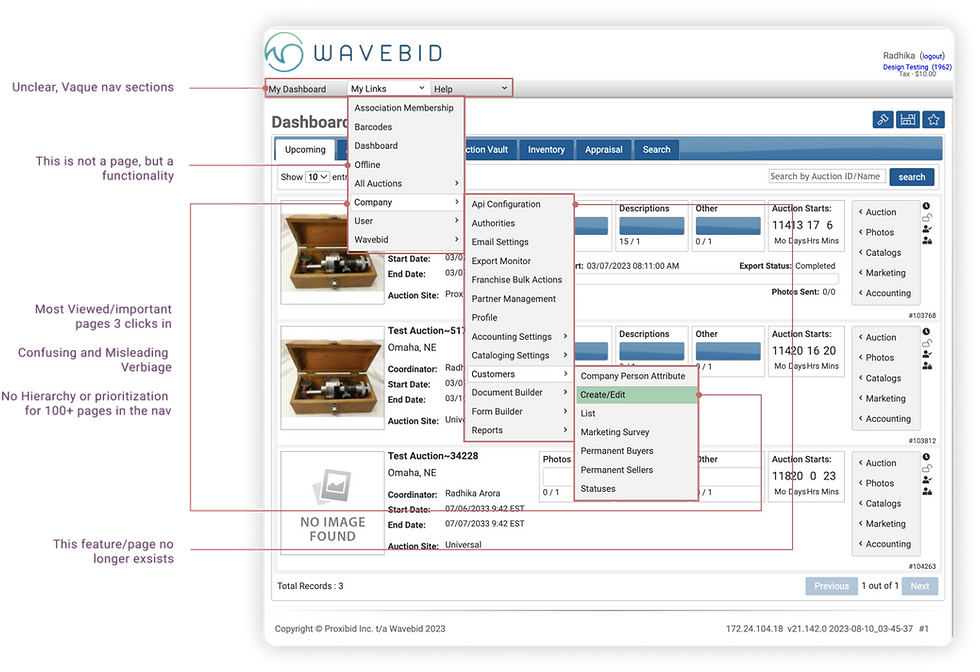
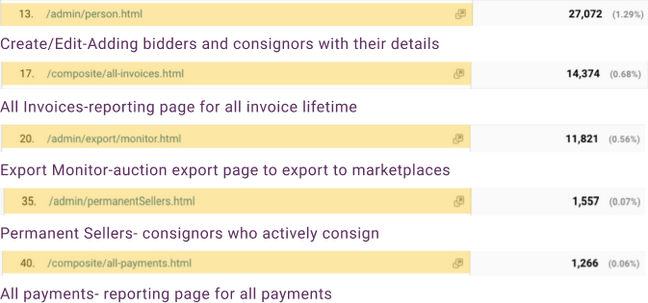
Google Analytics Data March 2023
Please note that as Wavebid is currently designed primarily around individual events, many page views are unique to each event and per user. However, the navigation includes pages and functionalities related to the company and overall product which are also important .
How can we create a SaaS product navigation that seamlessly aligns with our users' mental models, ensuring it is not only effortlessly simplified but becomes an intuitive extension of their workflow?
GOALS
BUSINESS GOAL
Increase User Adoption, Engagement, and Efficiency:
KPI: KPI: Track the utilization of advanced features, focusing on a 20% increase in the use of key functionalities such as invoice management and customer editing within six months post-redesign.
USER GOAL
Intuitive Platform Exploration & Access to Key Features:
KPI: Assess the average number of clicks required to access top-viewed pages like "Edit/Add Customer" and "All Invoices," targeting a 25% reduction in clicks within 2 months post-redesign.
OUR USERS
Returning Auctioneers:
Description: Seasoned auctioneers in the Industrial & Commercial vertical, particularly from small to medium-sized auction houses (Tier 2), with a history of using the classic version.
Characteristics: They are Familiar with the classic version's navigation and features. These auctioneers are typically part of smaller teams with diverse responsibilities wearing different hats.
Needs: They require Streamlined navigation for efficient access to frequently used features. These enhancements should preserve the familiarity of the classic version.
New Auctioneers:
Description:A diverse group of auctioneers from all ATG verticals, including Industrial & Commercial and Arts & Antiques, as well as from North American and Europe with varying skill levels and backgrounds. This group may include those from small to medium-sized auction houses (Tier 2) willing to adopt the new 2.0 version.
Characteristics: They have diverse skill levels and backgrounds and potentially are newer users or those willing to adopt a new platform.
Needs: They need a intuitive onboarding and navigation experience to facilitate a smooth transition ad well as access to a comprehensive set of features catering to both verticals.
RESEARCH & DESIGN VALIDATION
Card Sorting Workshop
Participants
-
Product Managers/Owners, Product Designers, UX Researchers
-
Client Success Team
Research Goals
-
Discover how users categorize information why they group ideas a certain way
-
What emerging patterns are there that we should look out for
Learnings
-
Users tend to categorize information under common terms such as "user profile," "accounting," "cataloging," and "support/help."
-
Confusion exists around specific Wavebid terms and their functionalities.
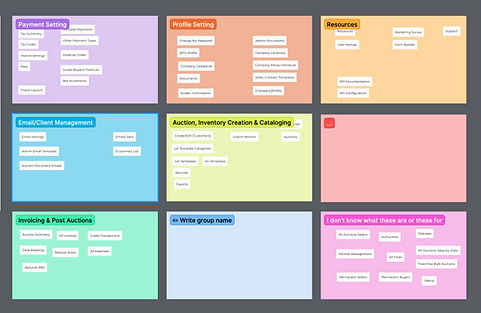
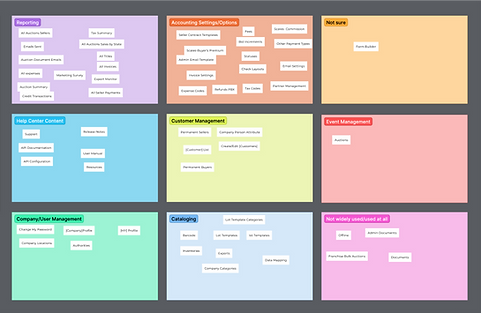
Card Sort with Auctioneers
Participants
-
Auctioneers from different verticals: Art & Antiques (A&A) vs. Industrial & Commercial (I&C)
-
Auctioneers in different Auction House sizes: Enterprise (designated individual doing one task) vs. Small to Medium size houses (1-3 people doing everything)
-
Auctioneers using different marketplaces: LiveAuctioneers vs. Proxibid vs. Bidspotter
-
Auctioneers from different regions: North America vs. United Kingdom
Research Goals
-
Understand auctioneers' mental models and validate internal team findings
-
Identify naming conventions that resonate with auctioneers (i.e. auction agnostic terms)
Learnings
-
Users associated terms like "Customer" with consignor and bidder items, but not with catalog export
-
Clear associations were found for some terms, while others, like "Builder," lacked a consistent understanding
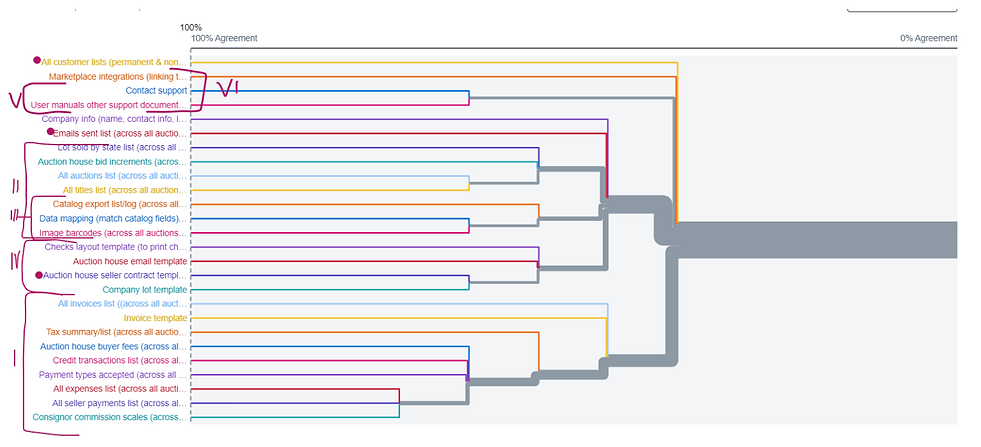
Usability Testing Oberserved:
Research Goals
-
Validate placement of auctioneer level information/settings nav that persists on all pages. (This also includes various other ‘auction-agnostic item like 'Help’)
-
Validate terminology for news vs existing users (i.e. auction agnostic terms)
-
Validate placement of other key areas: Help center, Profile, ‘Create’ button
-
Validate Navigation style: horizontal or vertical
Next Steps:
-
Rework the navigation to provide clearer signposting for company-level settings and auctions.
-
Utilize groupings based on the card sort, including "Accounting," "Customers," "Auctions," "Help," "Integrations," "System set up," and "Auction house info."
-
Optimize the placement and functionality of the 'Create' button for improved user understanding and context awareness.
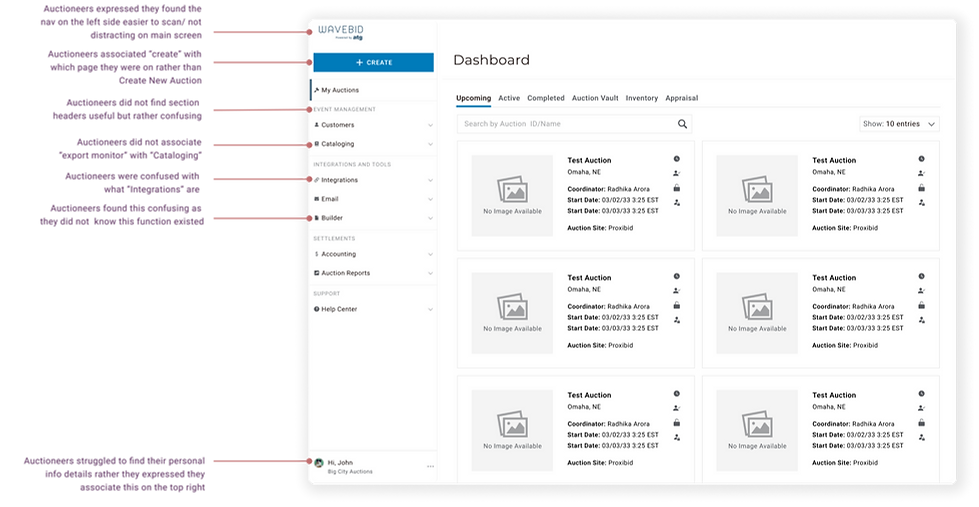
Version A
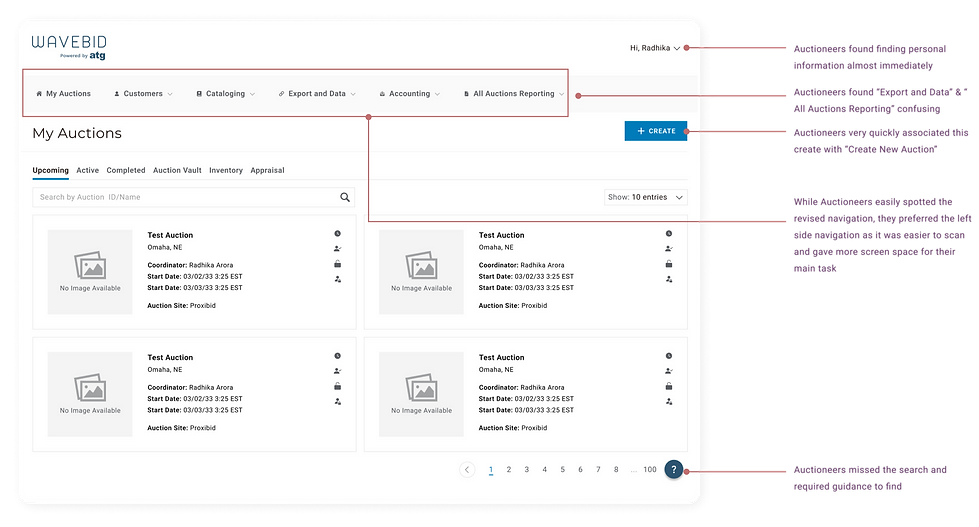
Version B
FINAL DESIGNS
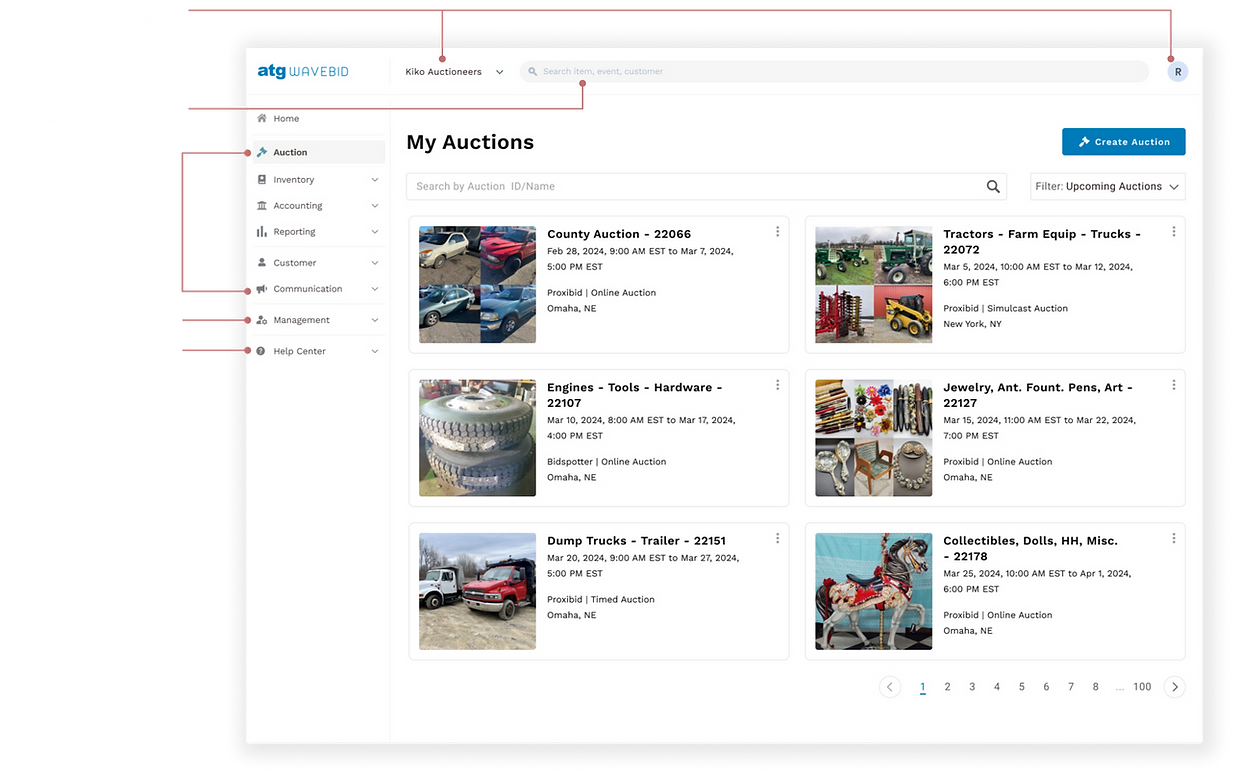

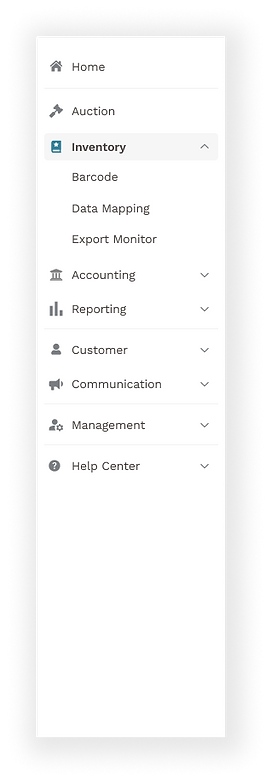
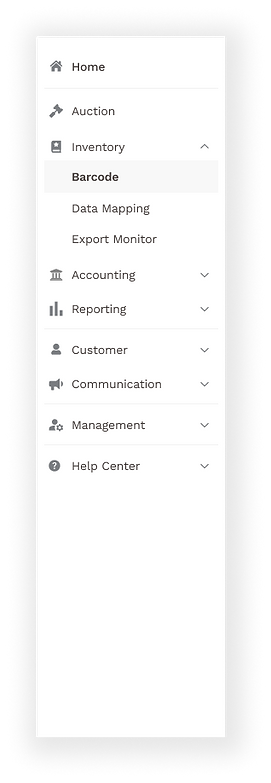
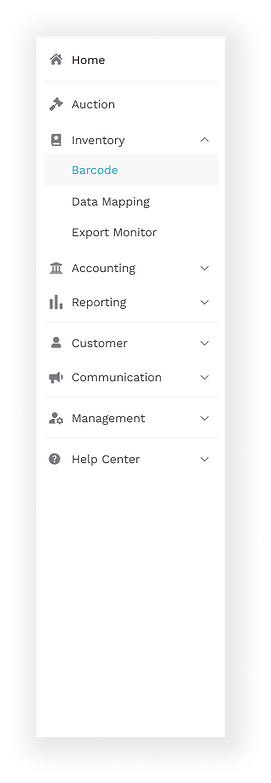
Compact View
Hover State
Main Page Active State
Submenu Page Active State
IMPACT
40% click rate reduction for most viewed pages; Boosting Platform Efficiency and increasing access to key features:
In the redesign of the classic version, the goal is to achieve a significant 40% reduction in the click rate for the most viewed pages. This metric serves as a key indicator of our success in streamlining navigation and enhancing user experience. By optimizing the pathway to frequently accessed features such as "Edit/Add Customer," "All Invoices," and "Export Monitor," the aim is to substantially improve platform efficiency. This reduction in clicks signifies a more direct and user-friendly journey, ensuring that auctioneers can effortlessly access essential features, ultimately boosting overall productivity and satisfaction.
Enhanced Seller Value and Engagement:
Through our comprehensive research process, sellers expressed a newfound sense of value and recognition. Their excitement underscores the success of our user-centric approach, demonstrating that their voices have been heard and incorporated into the redesign. This heightened seller satisfaction not only fosters a positive user experience but also strengthens the relationship between Wavebid and its users, contributing to increased engagement and loyalty within the auctioneer community.
Note: It's important to highlight that these are short-term impacts observed, and the long-term effects will be closely monitored post the anticipated EOY 2024 release of the new version.
TAKEAWAYS
Understanding users' mental models through empathy-driven research is crucial for crafting user-friendly designs; for instance, auctioneers may perceive the auction experience differently from our assumptions, favoring an organic approach over predefined stages. By prioritizing clear visual hierarchy and thoughtful interaction design, we can seamlessly guide users through the application, aligning with their mental models to enhance usability. Effective communication and collaboration with cross-functional teams are paramount for project success, underscoring the significance of teamwork in delivering cohesive and impactful products.
